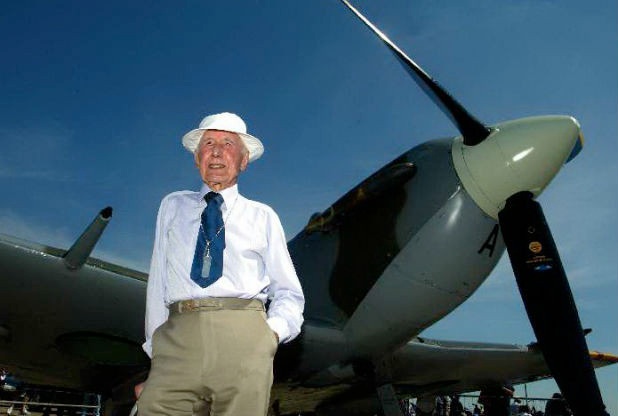Remembering aviator Alex – Spitfire-testing extraordinaire

THIS week we turn the spotlight on a civilian pilot who was undoubtedly Lincolnshire’s finest aviator – Alex Henshaw.
Although Alex came from an affluent Lincolnshire family he was born just south of the county border in Peterborough but ended up being educated at Lincoln School (now Christ’s Hospital School).
During his youth the young Alex was awarded a Royal Humane Society medal for rescuing a boy from the River Witham; an indication of his character and public duty which would become apparent in 1953.
He learnt to fly in the early 1930s, with his father funding the flying lessons at the Skegness and East Lincolnshire Aero Club operating out of the then Skegness (Winthorpe) Aerodrome.
Gaining his pilot’s licence in 1932 Alex set about making a name for himself in the world of air racing.
It was following the Kings Cup Air Race of 1933 that people began to take notice when he won the Siddely Trophy flying a Comper Swift.
The Comper Aircraft Company, while based at Hooton Park Aerodrome near Ellesmere Port in Cheshire, has an interesting connection not only with Lincolnshire’s aviation heritage but also with the development of the jet engine. When Sir Frank Whittle first joined the RAF as an apprentice at Cranwell, Flight Lieutenant James Allen was one of the instructors along with Flight Lieutenant Nicholas Comper.
Both men had an influence on the young Frank Whittle and it was through their friendship at Cranwell that Comper invited Allen to be a director of the company.
Alex subsequently won the Kings Cup in 1938 but this time flying a Percival Mew Gull. It was in this aircraft he set a world record for a flight from the UK to Cape Town in February 1939, a record that stood for more than 70 years!
At the outbreak of the Second World War, Alex Henshaw was a highly respected pilot who became a chief test pilot at the Castle Bromwich aircraft factory in Birmingham.
This factory manufactured over half of all Spitfires built in the Second World War. With a production rate over 300 Spitfires a month he tested up to 20 aircraft a day, often in poor weather conditions.
He became well renowned for his flying feats, once flying a Spitfire down Broad Street in the centre of Birmingham at low level!
The factory also produced Lancasters and it is believed Henshaw was the only pilot to ever barrel-roll the four engine bomber!
At the end of hostilities he was awarded the MBE – many thought he was worthy of a higher award.
Post war, Alex helped to set up the Trusville and Golden Sands holiday camps and was also involved in Sandilands Golf Club.
As we think back to the floods on the east coast of Lincolnshire two weeks ago, bad though they were, compared with the floods of 1953 the devastation was not as serious.
Alex’s home was flooded and the Sandilands village was isolated.
Displaying the same qualities as he did as a young lad, he spent two days wading out in icy cold waters checking on other families and helping to rescue people until outside help arrived.
For his efforts during the aftermath of the 1953 floods he was awarded the Queen’s Commendation for Bravery.
Alex Henshaw died in 2007 aged 94. A true Lincolnshire hero and aviation pioneer, Henshaw Avenue in Mablethorpe pays tribute to his name.